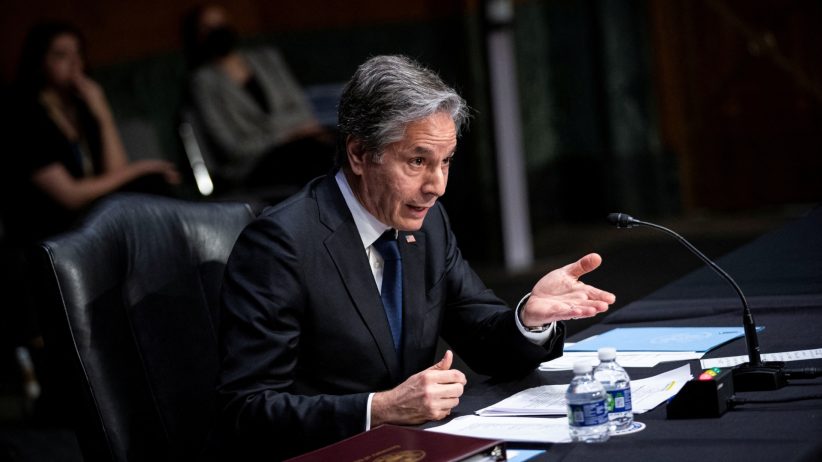By Mark Dovich
Secretary of State Antony Blinken pledged Tuesday to “take on” recommendations in a U.S. government study made public last month that found the State Department and Department of Defense had “not fully met” requirements under federal law on reporting U.S. aid to Azerbaijan.
“I’m happy to go back and take a look…at the concerns you’ve raised about the adequacy of the reporting,” Blinken said at a Senate Foreign Relations Committee hearing in response to a question from Bob Menendez, the committee chair, who requested the study. “I take what you say seriously, and I’ll take a look at that.”
The report by the Government Accountability Office, which audits the activities of the federal government, found that for the past eight fiscal years, the State and Defense Departments had “not fully met” reporting requirements that govern how the agencies report to Congress about aid to the Azerbaijani government.
The study recommended that the Secretary of State “should ensure that State’s reporting to Congress about U.S. assistance to the Azerbaijani government…addresses all elements of the statutory reporting requirement” provided by federal law. It gave similar recommendations to the Secretary of Defense.
At the heart of the matter is Section 907 of the 1992 Freedom Support Act, which restricts U.S. aid to the Azerbaijani government — with some exceptions — until Washington determines that Baku “is taking demonstrable steps to cease all blockades and other offensive uses of force against Armenia and Nagorno-Karabakh.”
Carve-outs include nonproliferation and disarmament assistance, humanitarian aid, and democracy-support activities, according to the GAO study. Section 907 does not apply to U.S. support for nongovernmental organizations in Azerbaijan.
However, subsequent legislation has allowed Section 907 to be waived annually, so long as the U.S. government determines that doing so contributes to international counter-terrorism efforts or to Azerbaijan’s border security and also “will not undermine or hamper ongoing efforts to negotiate a peaceful settlement between Armenia and Azerbaijan or be used for offensive purposes against Armenia.” It has been waived every year since 2002.
Under federal law, agencies that successfully apply for Section 907 waiver provisions must provide to Congress “within 60 days of the exercise of the waiver” a report describing the “nature and quantity” of the assistance to Azerbaijan, as well as how the aid could impact “the military balance between Azerbaijan and Armenia” and “negotiations for a peaceful settlement” in Karabakh.
The GAO study found that the State Department’s reports “did not consistently address certain of the required reporting elements,” including information on the potential impact of U.S. assistance on the military balance between Armenia and Azerbaijan and on peace talks between the two countries.
Similarly, the State and Defense Departments “did not consistently document their consideration of the waiver provision in program-level assessments” of their broader portfolios in Azerbaijan, the report concludes.
In official responses to the report, both the State and Defense Departments said they concurred with the GAO’s recommendations, though State also pointed out that “due to the unclassified nature of the report, there is a limit to the amount of detail that can be provided on the status of the military balance and the status of negotiations between Armenia and Azerbaijan.”
The U.S. government has provided about $808 million in assistance to Azerbaijan from fiscal year 2002 through fiscal year 2020, the study found, out of which only $164 million — or roughly 20% — was provided through programs requiring Section 907 waivers.
The agency with the largest obligations to Azerbaijan is USAID, which provided about $335 million to the country over the nineteen-year period covered in the report. Support from USAID is not covered by Section 907 either “because it consisted of humanitarian or nonproliferation assistance or activities to support democracy” or “because it was not provided to the Azerbaijani government,” the study notes.
Meanwhile, the Pentagon reported obligating about $201 million, while Foggy Bottom reported another roughly $164 million in obligations. In addition, the Department of Energy provided approximately $108 million to Azerbaijan over the period in review.
At the Senate hearing Tuesday, Blinken also noted that, “more broadly, I’ve been very actively and directly engaged with leadership in both Armenia and Azerbaijan…trying to advance prospects for a long-term political settlement with regard to Nagorno-Karabakh.”
“We have been developing and promoting various confidence-building measures,” he continued. “We’ve been trying to push back on any unilateral actions, particularly by Azerbaijan, that would only inflame the situation.”
According to publicly available fact sheets, the U.S. government has provided Azerbaijan with a total of “over $1.5 billion” in foreign assistance since 1992. It has provided Armenia with “over $2.9 billion” since that same year.
















